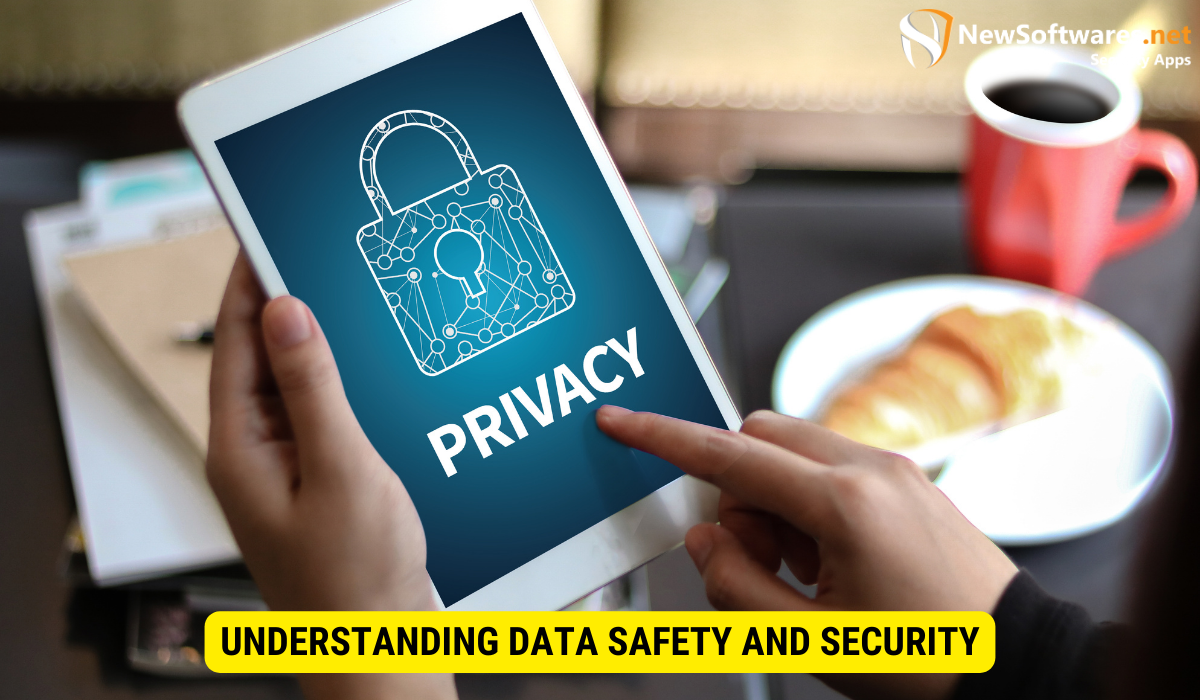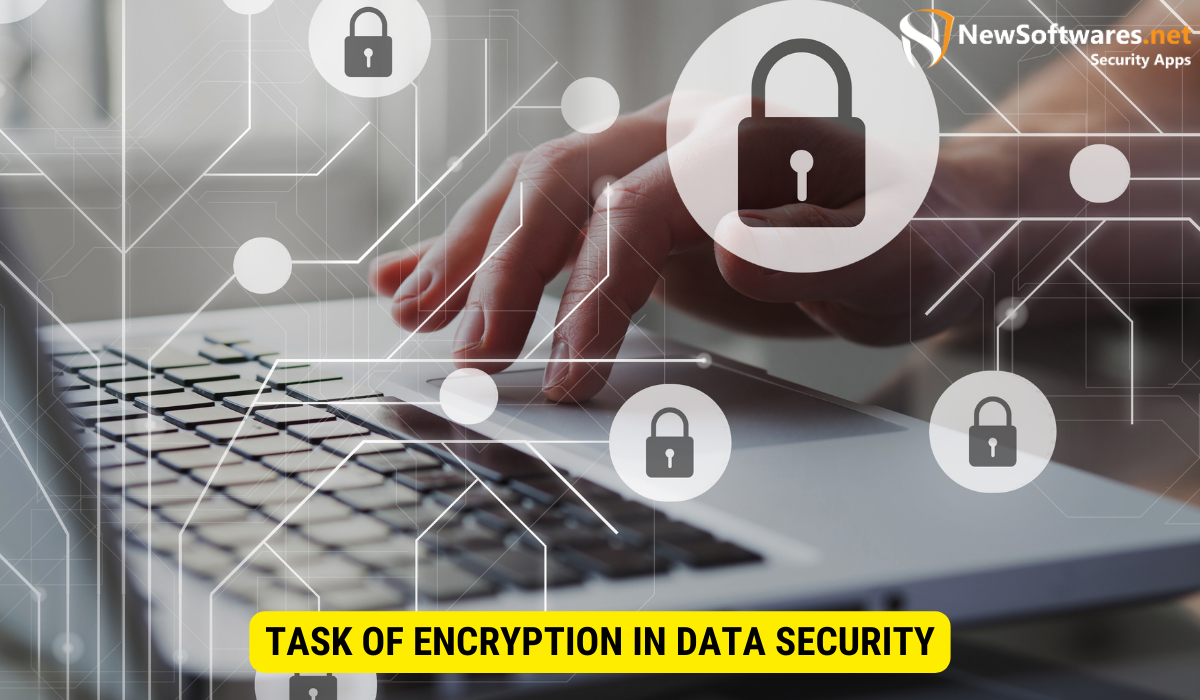Data safety and security are paramount in today’s digital age, whether for individuals or businesses.
Data safety and security have become supreme concerns for individuals & businesses in today’s digital age. With the increasing reliance on technology and the vast amount of data being generated and shared, it is essential to understand the importance of safeguarding sensitive information. Together,we will delve into data safety and security, discuss common threats to data, explore measures to enhance data safety and shed light on the role of encryption in protecting your valuable data.
Understanding Data Safety and Security

Data safety and security refer to the practices and measures to defend data from unauthorized access, alteration, or destruction. It encompasses various aspects, including data privacy, integrity, and availability.
Let’s start by defining data safety and data security separately:
Defining Data Safety
Data safety involves ensuring the integrity and accuracy of data. It focuses on preventing accidental or unintentional loss or corruption of data. This can be achieved through regular data backups, redundancy measures, and robust data management practices.
Data safety is crucial in maintaining the reliability and trustworthiness of data. Data can become vulnerable to errors, inconsistencies, or even complete loss without proper safety measures. For example, imagine a scenario where a company’s database suddenly crashes, losing critical customer information. This can have severe consequences, including financial losses and damage to the company’s reputation.
Organizations implement data safety measures such as regular data backups to mitigate such risks. These backups serve as a safety net, allowing data to be restored in case of unexpected events or system failures. Additionally, redundancy measures, such as storing data in multiple locations, ensure that even if one storage system fails, the data remains accessible and intact.
Robust data management practices also contribute to data safety. This includes implementing proper data validation techniques to ensure the accuracy and consistency of data. By validating data inputs, organizations can prevent the introduction of erroneous or malicious data that could compromise the integrity of the entire dataset.
What Does Data Security Mean?
Data security, on the other hand, is concerned with protecting data from unauthorized access, theft, or manipulation. It involves implementing security mechanisms to prevent data breaches and maintain the confidentiality of sensitive information.
Data security is critical to safeguarding sensitive information, such as personal data, financial records, or trade secrets. In today’s interconnected world, where cyber threats are prevalent, organizations must prioritize data security to prevent unauthorized individuals or entities from accessing confidential information.
Organizations employ various security measures to ensure data security. These measures include implementing strong access controls, for example user authentication and authorization, to restrict access to data only to authorized individuals. Encryption techniques are also commonly used to protect data during transmission or storage, making it unreadable to unauthorized parties.
In addition to access controls and encryption, organizations often employ intrusion detection & prevention systems to monitor network traffic & detect any suspicious activities that may indicate a potential data breach. Regular security audits & vulnerability assessments are conducted to recognize and address any weakness in the security infrastructure.
Data security is a continuous process that requires constant vigilance and adaptation to emerging threats. As technology advances, so do the methods employed by cybercriminals to breach data security. Therefore, organizations must stay efficient with the latest security practices and invest in robust security solutions to ensure the ongoing protection of their data.
The Importance of Data Safety and Security
Data safety and security are crucial for several reasons, regardless of whether you are an individual or a business entity.
In today’s digital age technology plays a significant role in protecting personal and business data has become more critical. The increasing reliance on digital platforms for a variety of activities, for instance online banking, e-commerce, and social media, has made us more vulnerable to cyber threats.
Personal Data Protection
Data safety and security are essential for individuals to safeguard personal information such as financial records, social security numbers, and health records. illegal access to this information can lead to identity theft, financial loss, or even reputational damage.
Imagine a scenario where a cybercriminal gets access to your financial records. They could potentially drain your bank accounts, leaving you in a state of financial distress. Moreover, if your social security number falls into the wrong hands, it could be used for fraudulent activities, causing severe harm to your credit history and overall financial well-being.
Furthermore, the protection of health records is of utmost importance. Medical information is highly sensitive and confidential. Any breach of this data can not only compromise your privacy but also result in potential harm to your well-being. For instance, if your medical records are tampered with, incorrect treatment plans or medications could be prescribed, leading to adverse health effects.
Data Security In Business
Businesses handle huge amounts of sensitive data, like customer information, financial records, and intellectual property. Ensuring the safety and security of this data is crucial to maintaining customer trust, complying with regulations, and preventing financial and legal repercussions.
When customers provide their personal information to a business, they trust it will be kept safe and secure. A data breach can shatter this trust, resulting in a loss of customers & damage to the company’s reputation. In today’s competitive market, where customer loyalty is paramount, businesses cannot afford to overlook data security.
Financial records are another critical aspect of business data that must be protected. illegal access to financial information can lead to fraudulent activities, embezzlement, or even bankruptcy. Businesses must implement robust security measures to prevent such incidents and ensure the integrity of their financial records.
Moreover, intellectual property, such as trade secrets, patents, and proprietary information, is the lifeblood of many businesses. Unauthorized access or theft of this data can have devastating consequences, including loss of competitive advantage and potential legal battles.
Complying with data protection regulations is also essential for businesses. Failure to adhere to these regulations can outcome in hefty fines, legal penalties, and damage to the company’s reputation. Taking proactive steps to ensure data safety and security is a legal requirement and a responsible business practice.
In conclusion, data safety and security are vital for individuals and businesses. Protecting personal information safeguards individuals from identity theft and financial loss while ensuring the security of business data, maintaining customer trust, compliance with regulations, and preventing potential legal and financial repercussions. Emphasizing the importance of data safety and security is crucial in today’s digital landscape, where cyber threats continue to evolve.
Common Threats to Data Safety and Security
Several types of threats can compromise data safety and security. Being aware of these threats is the first step in preventing them from occurring.
Cyber Attacks and Data Breaches
Cyber attacks are malicious activities aimed at gaining unauthorized access to data or causing harm to computer systems. This includes hacking, phishing, malware attacks, and ransomware. Data breaches happen when sensitive data is stolen, leaked, or exposed without authorization.
Insider Threats
Insider threats pose a risk to data security as well. These can be employees, contractors, or anyone with authorized access to sensitive information who intentionally or accidentally compromises data security. This can occur through negligence, malicious intent, or social engineering.
Measures to Enhance Data Safety and Security
Thankfully, there are measures you can take to enhance data safety and security:
Using Strong Passwords and Two-Factor Authentication
Strong passcodes combining uppercase and lowercase letters, numbers, and symbols can significantly strengthen your data security. Moreover, enabling two-factor authentication adds an extra layer of protection by demanding a verification code or physical device and your password.
Regular Data Backups
Regularly backing up your data ensures that even if you encounter a data loss or breach, you can quickly restore your information from a backup copy. Storing backups in a secure location is important to prevent unauthorized access.
Task of Encryption in Data Security

Encryption plays a vital role in data safety by transforming data into an incomprehensible form that can only be decrypted with a Specific password. This cryptographic technique ensures that even if data is intercepted or accessed without authorization, it remains incomprehensible to unauthorized individuals.
Understanding Encryption
Encryption uses complex algorithms to scramble data, making it unintelligible to anyone without the decryption key. This ensures that even if sensitive data is intercepted, it cannot be understood or used maliciously.
How Encryption Protects Your Data?
Encryption protects your data by rendering it useless to anyone without the encryption key. This is particularly important when data is transmitted over the internet or stored in the cloud, as it prevents unauthorized access during these vulnerable moments.
Key Takeaways
- Data safety and security are crucial in today’s digital age, both for individuals and businesses.
- Data safety involves ensuring the integrity and accuracy of data, while data security focuses on protecting data from unauthorized access or manipulation.
- Cyber attacks, data breaches, and insider threats are common data safety and security threats.
- Measures to enhance data safety and security include using strong passwords, enabling two-factor authentication, and regularly backing up data.
- Encryption plays a fundamental role in data security by converting data into an unreadable format.
Frequently Asked Questions (FAQs)
How can I protect my personal data?
To protect your personal data, using strong passwords, enabling two-factor authentication, and being cautious of phishing attempts are essential. Regularly updating your devices and software and avoiding suspicious websites and downloads can also help maintain data security.
How does encryption work in data security?
Encryption uses complex algorithms to scramble data, making it unreadable to unauthorized individuals. The data can only be deciphered with the specific decryption key. This ensures that it remains protected even if data is intercepted or accessed without authorization.
Can encryption be hacked?
While encryption is a robust method for data security, it is not entirely infallible. However, modern encryption algorithms are highly secure and extremely difficult to crack. As technology advances, encryption methods evolve to stay ahead of potential vulnerabilities.
How often should I back up my data?
The frequency of data backups depends on the rate at which your data changes and the importance of the information. Generally, it is advisable to back up data regularly, especially for critical data or frequently updated or created files.
What should I do if my data is breached?
If you suspect your data has been breached, it is crucial to take immediate action. This includes notifying the relevant authorities, such as your company’s IT department or the appropriate law enforcement agency. Changing passwords, monitoring your accounts for suspicious activities, and considering credit monitoring services if personal information is compromised are also advisable.
Conclusion
Ensuring the safety and security of your data is essential in today’s digital landscape. By understanding the concepts of data safety and security, recognizing common threats, and implementing appropriate measures such as strong passwords, two-factor authentication, regular backups, and encryption, you can protect your valuable information and maintain peace of mind. Remember, safeguarding your data is an enduring process that requires constant vigilance and proactive measures.
